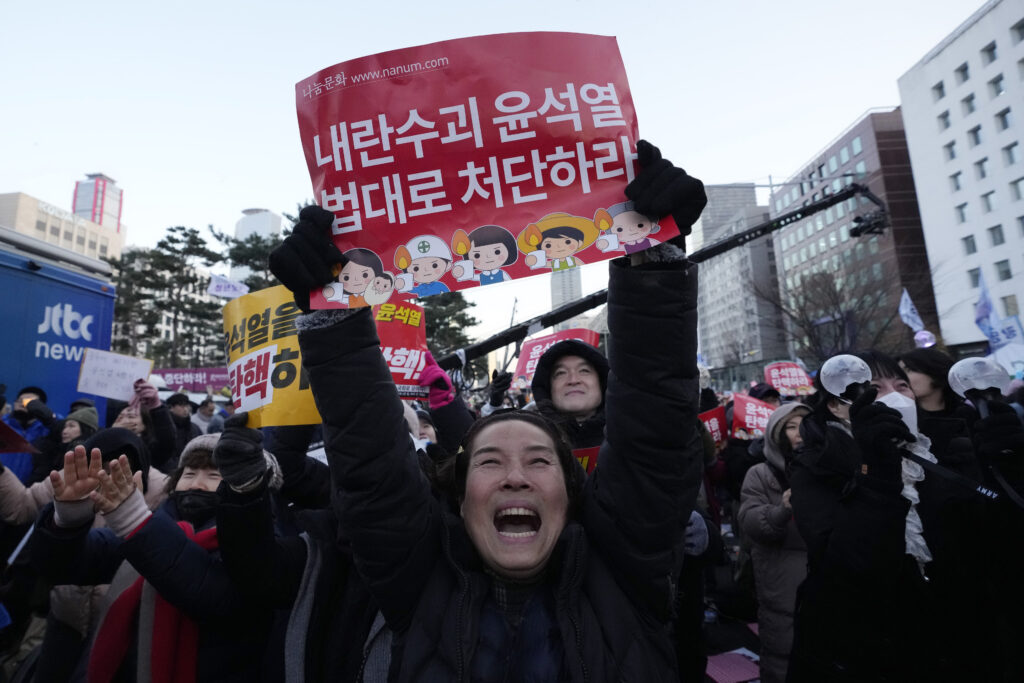Fate of South Korea’s Impeached President Falls to Constitutional Court, Which Could Take Months To Decide
Yoon Suk-yeol’s fighting words after vote by National Assembly mask the deep uncertainty surrounding the future of the president as well as that of the country and the Korean-American alliance.

South Korea enters a period of deep political division and uncertainty with the impeachment of President Yoon Suk-yeol by the National Assembly and his fate in the hands of a constitutional court that could take months to decide whether to approve the assembly’s verdict.
While thousands milled around the assembly building cheering the vote that barely exceeded the two-thirds majority needed to pass, Mr. Yoon vowed to keep fighting to the finish.
Stripped of power but still president in name, Mr. Yoon promised to “do my best for the country until the very last moment,” according to Seoul’s Yonhap News. His absence would be “temporary,” he said,” while the prime minister, Han Duck-soo, takes over as “acting president.”
Those fighting words, however, masked the deep uncertainty surrounding the future of the president as well as that of the country and the Korean-American alliance.

The court needs six of its nine members to approve impeachment, but now has on its bench only six, four appointed by Mr. Yoon since his election by a narrow margin in 2022. His leftist-led foes in the Minju or Democratic Party are demanding the appointment of three other judges who might want to see him removed.
Mr. Yoon’s ardent advocates, dead set against the Minju, see Mr. Yoon surviving as president while Mr. Han considers how to fill out the court. During the interregnum leftists and rightists are sure to take to the streets of Seoul and other cities, battling over bitter differences in policies.
“South Korea is deeply polarized,” a retired general, Chun In-bum, told the Sun. “It will be important for the politicians to find a medium.”
Whether they can do that will depend in part on criminal cases hanging over the head of the Minju leader, Lee Jae-myeong, whom Mr. Yoon defeated by less than one percent in the 2022 election. Mr. Lee has been fighting charges of corruption while he was mayor of Seongnam, south of Seoul, and then governor of Gyeonggi province surrounding the capital. Five potential witnesses have mysteriously died.
“The final adjudication of the impeachment is important, but there are many variables in the process such as the verdict for Lee,” said General Chun. Mr. Lee’s foes say he’s sure to go to prison, but he may avoid that fate by winning a special election if the court ousts Mr. Yoon.
It was only by the defection of a dozen members of Mr. Yoon’s People Power Party that the Minju, along with five minor parties, mustered 205 votes – five above the two-thirds margin needed for impeachment by the 300-member assembly. The motion passed a week after failing in the first attempt after falling two votes short of the requisite 200.
Mr. Yoon’s foes are attempting to bring charges of insurrection and other offenses against him for invoking martial law and having troops surround the assembly while helicopters hovered overhead. The Minju-dominated assembly, convening despite efforts to keep its members out of the building, voted down the motion, forcing Mr. Yoon to revoke his decree six hours later and plunging the country into crisis.
Advocates for Mr. Yoon believe that Chinese saboteurs and spies influenced the Minju, which has opposed Mr. Yoon in almost all his attempts at legislation, including the state budget. Mr. Yoon’s foes charge that he violated numerous laws while attempting to rule as an autocratic leader. They vow to have him arrested for treason even as he still holds the title of president.
“It’s a sad and unfortunate day for South Korea, but this day had to come,” a former senior American diplomat in Korea, Evans Revere, told the Sun. “Once President Yoon, who had clearly lost his mandate to lead the country, decided not to resign, it was inevitable that it would come to this, especially after his own party’s leader allowed the party’s members in the National Assembly to vote their consciences.”
Mr. Revere was confident, however, in the ability of the prime minister, Mr. Han, a former ambassador to Washington who’s well known to American officials, to hold things together.
Mr. Han, in Mr. Revere’s view, “has his hands full as Korea tries to repair the damage to its image and reputation, to the confidence of the United States in its Korean ally, and to key institutions, especially the military, which for a few fleeting hours last week seemed poised to help undo Korea’s democracy.”

